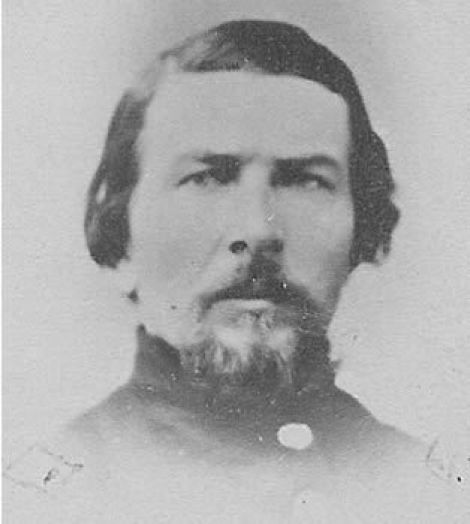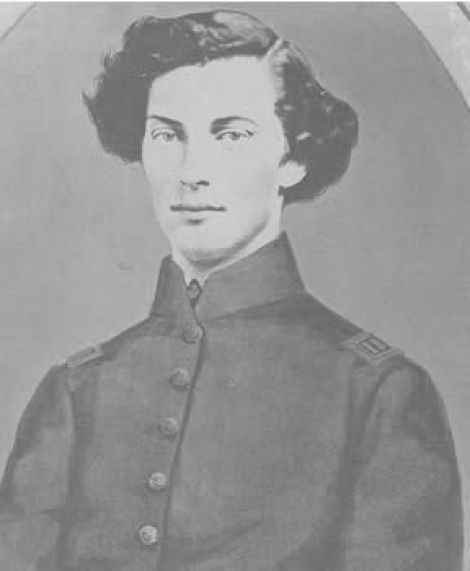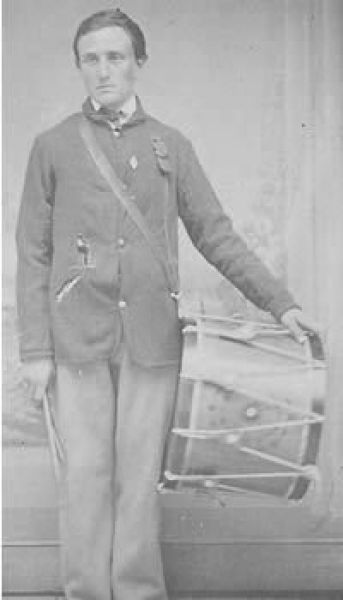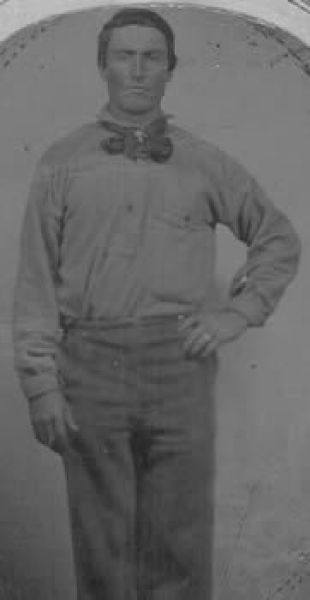Other Resources
This is meant to be a comprehensive list. If, however, you know of a resource that is not listed below, please send an email to ng.ny.nyarng.list.historians@army.mil with the name of the resource and where it is located. This can include photographs, letters, articles and other non-book materials. Also, if you have any materials in your possession that you would like to donate, the museum is always looking for items specific to New York's military heritage. Thank you.
Auchmoedy, Silas S. et al. Silas S. Auchmoedy letters, 1862-1865.
Description: 29 items
Abstract: Letters from Silas S. Auchmoedy to his brother Lewis, his parents, and his sister Maria, dated between Sept. 5, 1862 and Feb. 24, 1865. He describes camp life and experiences of battle at Fredericksburg and Gettysburg. He also discusses news of family and friends, and expresses strong support for the war and anger with the draft rioters in New York.
Located at New York University.
Ayres, Alfred N. Civil War letters,1861-1865.
Letters from Ayres and his brother, Chauncey L. Ayres, to their family in Harmony, N.Y., especially their father, Joseph Ayres, and brother, Sereno Ayres, while serving with 72nd and 120th New York Infantry regiments and 9th New York Cavalry Regiment in the Virginia campaigns during the Civil War.
31 items.
Located at Rutgers University Libraries.
Butler, Shannon. "Far from Dull, it's a "Sharpe" sword!." : Gen. George H. Sharpe and the artifacts he left behind." Military Collector & Historian. 63 :2 Summer, 2011. 108-112.
"The colors of the One hundred and twentieth." Olde Ulster VII (1911) 149-51.
Coutant, Charles T. "General Sharpe and Lee's surrender." Olde Ulster VIII (1912) 257-79.
Cranston, George W. HaerleColl
(Letters from enlisted man of 120th NY, George Tate)
Located at the Military History Institute in Carlisle, PA.
"The departure of the One hundred and twentieth." Olde Ulster VII (1911) 193- 206.
Emmett, Daniel Decatur, et al. Dixie Unionized : respectfully dedicated to Cassius M. Clay's Washington Guards. New York (547 Broadway, New York) : Firth, Pond & Co., 1861.
Duganne, A. J. H. The fighting Quakers : a true story of the war for our union. Farmville, Va.: Farmville Print, 1995.
Eggleston, Clark M. A funeral discourse in memory of Capt. Ayers C. Baker (120th reg. N.Y.S.V. late of Greenville NY) killed at the battle of Gettysburg, July 2d, 1863, preached by Rev. C. M. Eggleston, at Greenville, July 26, 1863. Coxsackie: F. C. Dedrick, printer, [1863].
Emmett, Daniel Decatur and Muzzy, A. W. Dixie Unionized :respectfully dedicated to Cassius M. Clay's Washington Guards. New York: Firth, Pond & Co., 1861.
1 score ([5] p.) ; 36 cm. In: Keffer Collection of Sheet Music.
Everett, J. H. J.H. Everett letters, 1864-1865.
Description: 1 folder (.05 cubic feet)
Abstract: The J.H. Everett Letters are copies made by Joseph Frederick Waring, II of two letters written from Capt. J.H. Everett of the 120th Regiment, New York Volunteers, Sherman's Army, to Divine of the 143rd Regiment, New York Volunteers. The first letter written December 19, 1864 from near Savannah, Georgia describes Sherman's march from Atlanta to Savannah. Everett notes the army's destruction, destroying all that could not be eaten, burning cotton and cotton gins, and ruining the railroads. He outlines the path they took and their halt at the defenses outside of Savannah, Fort McAllister. Everett describes the capture of Fort McAllister by the 2nd Division, 15th Army Corps and states that "Savannah has got to succumb, we shall soon control the river." Everett's letter of January 29, 1865, was posted from the field in South Carolina, as his company was campaigning through the state. He describes the destruction of all supplies by the rebels in anticipation of their approach. Everett mentions the re-election of President Lincoln.
Held by the Georgia Historical Society.
Fiftieth anniversary of the muster into service of the One hundred and twentieth regiment,N.Y. V. in the War for the Union, celebrated at Kingston, New York, August 22nd, 1912. [Kingston, Freeman pub. co., 1912].
Foote Family. 120th New York Infantry, Cos. K and M. Papers (1859-1864).
31 items.
Papers consist largely of receipts for goods and services purchased by Foote and Grant, a business that was situated in Catskill, New York. Also includes two Civil War letters written by two soldiers, John Williams and Bartholomew Mulligan, both of whom served in the 120th New York Infantry Regiment.
Located at the New York State Library Manuscripts and Special Collections.
Greene County Historical Society (Coxsackie, N.Y.). Greene County, N.Y. manuscript file, 1736-1973.
Description: 6 cubic ft.
Abstract: Letters, wills and estate papers, financial records, legal papers, deeds, maps and land surveys, slave documents, military papers, and other documents pertaining to individuals, families, communities, and businesses in Greene County. Family names include Baker, Clark, Eaton, Fiero, Lawrence, McCarty, Pratt, Prevost, Reed, Salisbury, Sherman, Sickles, Silvester, Van Dyck, Van Loan (Loon), and Van Vechten. Subjects include shipping, roads and turnpikes, cement companies, Civil War, pottery, railroads, education, newspapers, churches, mills, firemen, elections, politics, government, poor records, ferries, steamboats, women's clubs, lotteries, merchants, militia, 120th Regiment of the New York State Volunteers, slavery, Spanish-American War, the Susquehanna Turnpike, tanning, temperance, transportation, War of 1812, whaling, and the Whig Party. Of note are letter from John Quincy Adams written from Congress, 1833; two letters on politics by Henry Ashley, Congressman, 1826; notebook of Ephraim Beach regarding his engineering work on the Canajoharie & Catskill Railroad, 1836; printed proceedings of the General Assembly of the Colony of New York, 1773, and the laws of the Colony of New York, 1762; Civil War papers of James Malcolm Pierson (1832-1905); correspondence of Nicholas Sickles regarding his legal practice, 1821-1834; and speeches and letters of Peter H. Silvester concerning Whig politics, 1849-1850.
Held by the Greene County Historical Society. Jessie Van Vechten Vedder Memorial Library, Coxsackie, NY.
Getchell, Thomas V. and Marilyn L. Getchell. Orrin's Story : Patriotism and Love of Country. The Union Now and Forever. T & M Getchell an Imprint of Telemachus Press, 2012.
For more information please see: http://www.orrinsstory.com/Home.aspx
Hopkins, Henry H. Letters, 1862-1865.
14 items.
Civil War letters of Hopkins while serving in the U.S. Army stationed at Alexandria, Va., and after his appointment as chaplain of the 120th Regiment of New York Volunteers, to Mary Ames and Winona C. Ames. Discusses conversion of Fairfax Seminary into a convalescent camp, the surrender of Harpers Ferry, the New York draft riots, the battle of Cold Harbor, the siege of Petersburg, family matters, and the building of a chapel.
Located at Duke University.
Jones, Lucius. In the War of the rebellion from 1861 to 1865. [Fredonia, NY]: 1913.
Jones, Electus W. and Macomber, James G. Papers,1860-1863.
Civil War letters of Jones and of James G. Macomber, a member of the 154th New York Infantry, describing army life in camps and forts around Washington, D.C.; the army's farewell to General George B. McClellan, 1862; the battle of Fredericksburg; the "Mud March," 1863; and Vicksburg, Miss., after its surrender.
18 items.
Located at Duke University.
Kingston journal extra, Wednesday, May 18th, 1864 : the Virginia campaign, casualties in 120th regt. [Kingston, N.Y.] : The Journal, 1864
Description: 1 sheet ; 37 x 16 cm [broadside]
Located at the University of Notre Dame.
Lyons, Jacob. Diary,1862-1865.
Civil War diary of Lyons, a New York City cigar maker and English immigrant, who served in Virginia with the 71st New York Regiment, 1862- 1863, and the 120th New York Regiment, 1864-1865. Entries from 1862 and 1863 are sketchy; those from 1864 and 1865 are more detailed, describing camping, marching, picketing, skirmishes, battles, and casualties. Of the three volumes, two are somewhat differing versions of entries for 1862 and 1863.
3 v.
Located at the University of North Carolina, Chapel Hill.
Miller, John N. Letter to "friend Nathan," 1862 October 5.
Description: 8 items.
Abstract: Letter describes Miller's work as one of the doctors in charge of the hospital in the Capitol at Washington, treating wounded [from the 2nd Battle of Bull Run?]. With the letter is correspondence, 1925,1949, concerning the 2nd Battle of Bull Run, the 120th New York, and the discovery of the letter.
Held by the University of Virginia.
Military register Company E, 120th regiment New York volunteers. Washington, DC: Geo. M. Lankton [1865?].
Plank, Will. Banners and bugles; a record of Ulster County, New York and the mid-Hudson region in the Civil War. Marlborough, NY: Centennial Press, 1972.
Sharpe, George Henry. "General Sharpe at the unveiling." Olde Ulster VIII (1912) 321-31.
Sharpe, George Henry. Addresses delivered at the Music hall, Kingston, at the seventh annual meeting of the 120th regimental union, by General George H. Sharpe and General Theodore B. Gates. Kingston: Daily Freeman print, house, 1875.
Sketch of regiment's service at Gettysburg. BrakeColl
(Undated written sketch)
Located at the Military History Institute in Carlisle, PA.
Sutch, Gerald E. The Civil War : the town of Prattsville and the neighboring Greene, Delaware & Schoharie County area. Cornwallville, NY: Hope Farm Press, 1986.
Sylvester, Peter Henry, et al. Letters, 1830-1862.
Description: 4 items
Abstract: A collection of three manuscript letters received by Peter Henry Sylvester from various individuals. The first was written by John B. Adger Read at Princeton Seminary, February 5, 1830 regarding experiences of college life along with commentary on issues relative to politics, education, and religion. The second letter was written by John G. Floyd of Memphis, Tennessee, relative to matters of government and politics, The third letter with postal cover was written by Lt. Minor H. Greene of Company D, 120th New York Volunteers from a camp near Fredericksburg, Virginia, December 7, 1862. This letter details Greene's experiences of military service during the Civil War as well as comments about poor living conditions in army camps, problems of disease, and low morale of many of his fellow soldiers. Certain items in this collection that were reported lost were later recovered by the Office of New York State Attorney General in January 2008.
Located at the New York State Library Manuscripts and Special Collections.
Tate, George. Civil War Miscellaneous Collection
(Enlisted man's letters, Aug 14, 1863-Mar 28, 1865)
Located at the Military History Institute in Carlisle, PA.
Tate, George. Papers of George Tate, 1854-1908.
Diaries, military records, correspondence, and photographs documenting Tate's life, especially his Civil War career. The three Civil War diaries cover the campaigns of 1862-1865 in Virginia and Maryland, and discuss war news and rumors, including the news of Lincoln's assassination, and everyday life in camp. Tate's service in Texas is also recounted in two letters to Elnora L. Guest (1903). Also included a copy of pre-war diary made "for presentation and reference," documenting Tate's life in Fredonia in 1854-1860, including accounts of Fredonia Academy. The military records include Tate's commission, discharge papers, muster rolls, pension certificates, etc. Also included are photographs of officers and soldiers of the 72nd New York Regiment, a scrapbook of newspaper clippings of lists of the Union casualties, and two photographs of Tate taken in the early 1900s. Additionally there are two bound volumes: Henry Le Fevre Brown's "History of the Third Regiment Excelsior Brigade 72d New York Volunteer Infantry 1861-1865" (Jamestown, N.Y. :Journal printing Co.], 1902) and a copy of the The English version of the polyglott Bible, containing the Old and New Testaments; : with the marginal readings ... Stereotyped by L. Johnson (Philadelphia: Thomas, Cowperthwait, & Co., 1844), with an inscription indicating that Tate acquired it in Brazos Santiago, Tex. 28 pieces. 1 box.
Located at the The Huntington Library, San Marino, CA.
Turner, Emory S. Emory S. Turner document, circa 1862.
Description: 0.015 linear feet (1 folder)
Abstract: [Lieutenant, New York Infantry, 120th Regiment, Company D]. Copy of Civil War manuscript re spending last year of war in Washington, [D.C.].
Held at the University of California, Santa Barbara.
Van Santvoord, Cornelius. The One hundred and twentieth regiment, New York state volunteers, a narrative of its services in the War for the Union, by C. Van Santvoord, Chaplain. Roundout: Press of the Kingston Freeman, 1894.
Available online at: http://persi.heritagequestonline.com.dbgateway.nysed.gov/hqoweb/library/do/books/search/publications
Wilber, Eseck G. Civil War letters, 1862-1864.
.5 linear ft.
Located at Rice University.
Wilber, E.G. MurraySmithColl
(Enlisted man's letter, Jul 10, 1863)
Located at the Military History Institute in Carlisle, PA.
Worman, Ed. Casualties and captured at James City, Virginia on October 10, 1863 (and two men captured at Mine Run, VA, in late November, 1863). 2016. 22 pages.
Zabriskie, Francis Nicoll. The post of duty, a funeral discourse in memory of Capt. Lansing Hollister ( 120 regt. N.Y.S. vol., ) killed at the battle of Gettysburg, July 2d, 1863, by Rev. F. N. Zabriskie. Coxsackie: F. C. Dedrick, printer [1863].
Unit bibliography from the Army Heritage Center
Items in the museum collection are in bold.
*Contributed by Peter G. Tsouras:
I noticed in your website on the 120th New York that you stated the regiment was mustered out on 3 June 1865. I have correspondence from Maj. Gen. Sharpe's military personnel files, obtained from NARA, that states that the regiment was not mustered out until after it returned to Kingston on 9 June (Sharpe was the official commander of the regiment, although he had been detailed to be the intelligence officer for the Hooker, Meade, and then Grant, for the rest of the war).
In fact, there is an outraged telegram on 10 June from Sharpe to Maj. Gen. Dix, commanding the Divison of East, in NYC, explaining how the Muster Officer for NY refused to muster the unit out or pay them because the regiment had failed to turn in their weapons at Hart's Island (NYC, I presume) on their way thru the city and thus were in violation of General Orders 94. Sharpe stated that the weapns were being turned into an ordance officer as he wrote the telegram.
Dix wrote to the Muster Officer to pay them if you can, but that officer, one Lt. Col. Dodge, was a pompous, puffed up, self-important bureaucrat and replied that he had no knowledge that the weapons were being turned in, and the regiment would have to return to his jurisdiction in NYC and turn in their weapons, at no charge to the U.S., before he would authorize their final pay and mustering out and that he had sent a full report to the War Department. There, unfortunately, the story is left hanging. Knowing Sharpe's connections, I can only presume that the officious Dodge was put in his place, and the unit mustered out rather quickly because there was no mention of the indcident in the regimental history by Van Santvoord.





